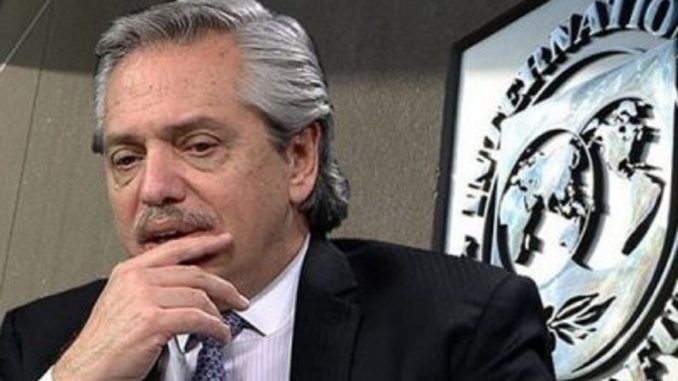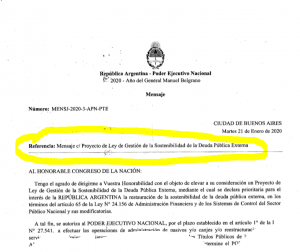
The government has sent a bill to Congress that it negotiates rapidly with the “opposition” and secretly with representatives of the creditors.
With the pompous name of “Law of Management of the Sustainability of the External Public Debt”, it makes a true affidavit of recognition and commitment to pay, and asks Congress for a blank check to negotiate with the usurers. Super powers and a blank check tailored to creditors with waiver of sovereignty included and submission of the country to the jurisdiction of international courts.
The Small Print
There is a load of type on the bill listing the legal tools with which the previous Kirchnerist government became a serial and punctual payer. There is also abundant criticism of Macrism for having increased the debt and leaving the country “outside of the international markets”. But the important thing, the true letter of intent, comes later.
1) They propose that the restoration of “sustainability of the external public debt” is a priority. This means the recognition of the debt and a commitment to organize the economy in order to pay. Gone are the campaign speeches, when Alberto F. denounced the revolving door through which almost all the funds entered from the IMF ended in capital flight. Recall that, of 44,867 million dollars that came from the IMF loan, 36,640 escaped. Eight out of every ten dollars! Though it is an “odious” debt, the current government legitimizes it. It is not even willing to carry out an audit, an independent investigation, to ratify its illegitimate nature by suspending payments.
2) The Executive Power is authorized to negotiate with the IMF and the “vulture” creditors as it pleases. That is to say: renegotiate, restructure, “reprofile”… in other words, different tactics to pay interests and capital.
3) The bill gives the Minister of Economy “enforcement authority” and gives him a free hand to materialize the necessary means for agreements and payments. Namely: issue securities, appoint financial advisors (read: all power to banks) to coordinate and operate agreements and payments, to approve and sign contracts with any financial agent or banking institution he wants.
4) The bill empowers the Chief of Staff to make relevant budgetary modifications to allocate expenses to debt payments. “Soup again”. Therefore, the national and Buenos Aires budgets were extended until agreements are reached with the IMF and the usurers.
5) The icing on the cake: the bill authorizes the Executive to “contemplate in the regulations and include in the pertinent documents the habilitations and clauses to establish the extension of jurisdiction to foreign courts”. And expressly waives “opposing the defense of sovereign immunity” in case of claims. That is, nothing to envy from the agreements reached by Menem, Cavallo and those of the Kircherists, who accepted the imperialist interference of New York courts: a shame.
Of course, in line with the slogan of “grow to pay,” the bill says clearly that it must be compatible with the recovery of the productive economy and with the improvement of basic social indicators. Therefore, the Central Bank reserves cannot be compromised. Of course, it says nothing about wages, social budgets or retirements.
Because they know that the economic framework is very different from the beginning of the Kirchnerist government that benefited from a “tailwind” in the world economy, with high commodity prices and an economic rebound that allowed a significant accumulation. Today, the international capitalist crisis dominates, there is record indebtedness, a brutal stagnation with lay-offs and misery and narrow margins that do not allow brushing the dust under the carpet. The dilemma today is another one. The government either applies austerity on workers and the middle class to pay the debt, or applies it on the IMF and the corporations and uses the money of the debt to increase social budgets.
Mobilize to Repudiate the Debt
A strong campaign against the debt is needed, to demand an independent audit and non-payment. For an increase in wages, pensions (with 82% mobile) and social plans, all with trigger clauses for automatic adjustments according to inflation.
From the MST we have been proposing this policy in the labor and popular movement and in various fields with the aim of promoting debate and mobilization actions.
In that sense, we have made a proposal to the Left and Workers Front Unity board: to take up an energetic campaign of diffusion and actions, of rejection of the official project and postulation of an alternative proposal of the left. Preparing a joint statement, holding a press conference the day before the legislative treatment of the project to raise the position of the FIT-Unidad deputies and calling for a rally in front of Congress the day the bill is treated.
Guillermo Pacagnini









